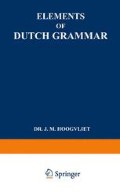Abstract
A verb is called dissonant, when the radical vowel is changed in the imperfect, and the past participle ends in -en instead of -d or -t, as: drijven, to drive, dreef, gedreven. All the other tenses are conjugated like those of the assonant verbs.
Access this chapter
Tax calculation will be finalised at checkout
Purchases are for personal use only
Preview
Unable to display preview. Download preview PDF.
Rights and permissions
Copyright information
© 1891 Springer Science+Business Media Dordrecht
About this chapter
Cite this chapter
Hoogvliet, J.M. (1891). Dissonant Verbs (strong conjugation). In: Elements Dutch Grammar. Springer, Dordrecht. https://doi.org/10.1007/978-94-017-6224-3_10
Download citation
DOI: https://doi.org/10.1007/978-94-017-6224-3_10
Publisher Name: Springer, Dordrecht
Print ISBN: 978-94-017-5798-0
Online ISBN: 978-94-017-6224-3
eBook Packages: Springer Book Archive

